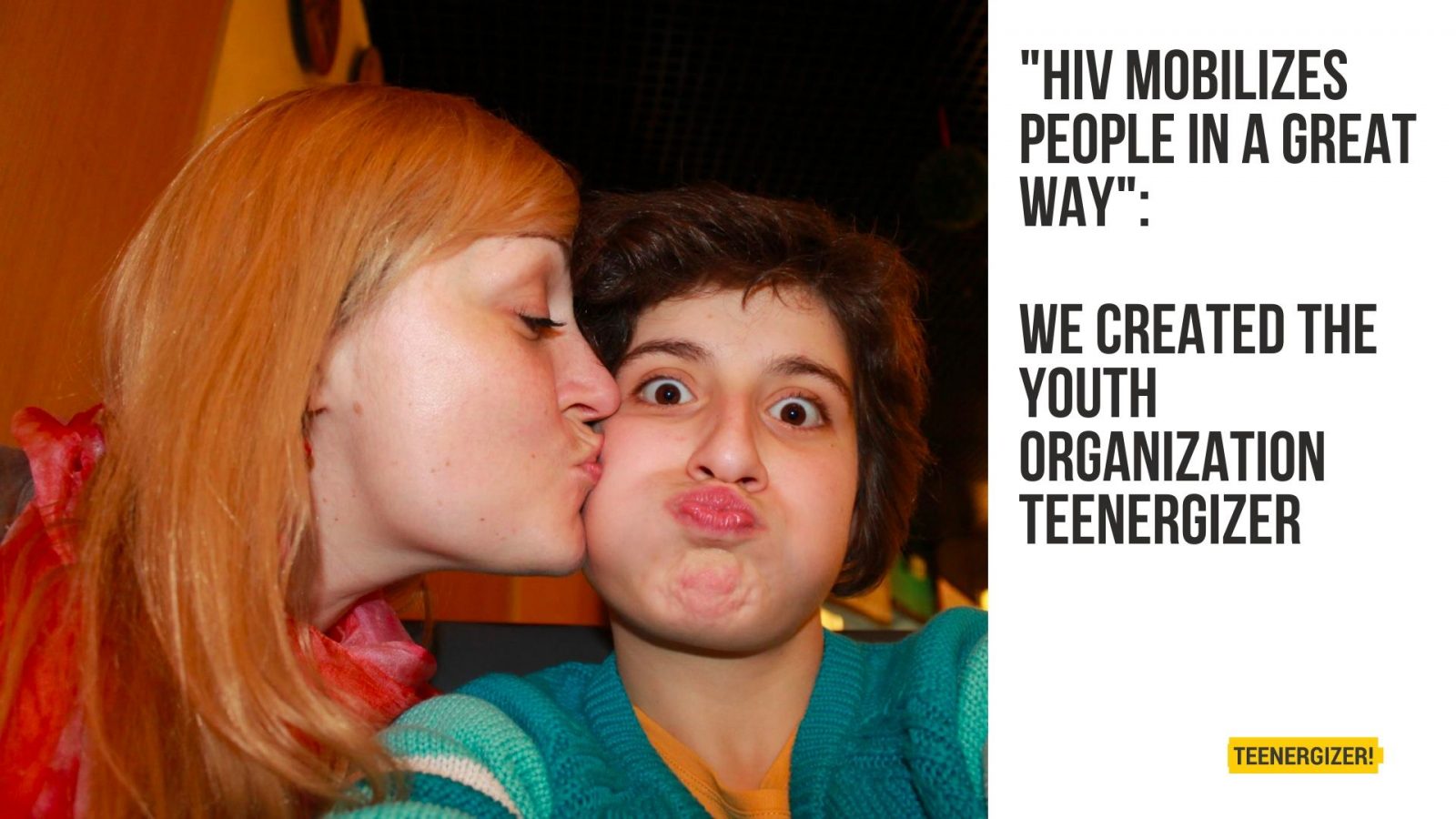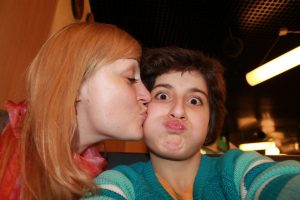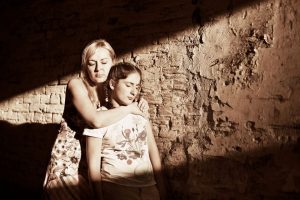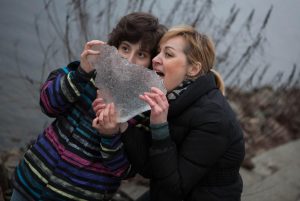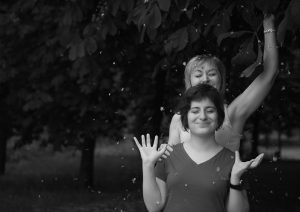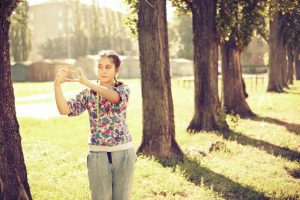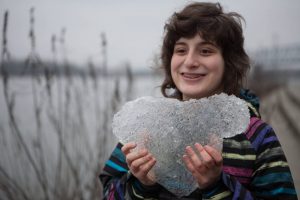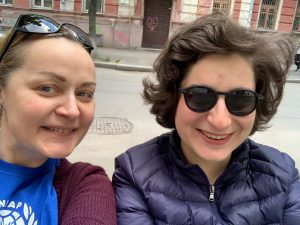In the “Partners” section, we talk about women who came up with a joint project and succeeded in it. At the same time, we are going to destroy the myth that women are incapable of friendship and can only compete aggressively.
TEENERGIZER is an organization that unites HIV-positive young people and their friends with HIV-negative status. The project includes an online counselling platform, HIV and sexual health pieces of training, support groups for HIV-positive adolescents and HIV parties (VICHerinka) for young people with the participation of stars. The Teenergizer team is promoting sex education as well as adolescent rights at the parliamentary level: they are currently working on the №2684 bill on the realization of adolescent health rights.
In the 5 years since its registration, Teenergizer has covered 4 countries and 10 cities in Eastern Europe and Central Asia. The central office, which coordinates the work of the regional teams, is located in Kyiv.
The founders of the organization are Olga and Yana Panfilova, HIV-positive mother and daughter. Yana is the chairwomen of the board and the ideological inspirer of Teenergizer, Olga is the director, who is also a psychologist and a gestalt therapist.
We talked to the partners about why they have dedicated their lives to this project and what they consider to be the main achievements of Teenergizer.
About HIV-positive status
“I had a tremendous sense of guilt for passing HIV on to my child”
OLGA: I used drugs for 8 years. During this time, I shoot up everything I had and was left without money. To get to a free rehabilitation centre, I had to take an HIV test. When I came to get the results, the doctor called me and a girl and said, “I have good news for one of you and bad news for the other. Who should I give valerian to? ” This girl asked for valerian, and I was diagnosed with HIV.
YANA: I found out about my status when I was 10. But Olya has been aware since I turned three.
OLGA: When I gave birth to Yana in 1997, firstly, I still used drugs, and secondly, there was simply no state program in Ukraine to prevent perinatal transmission. Therefore, I passed HIV to my daughter.
For the first three years, Yana lived in an orphanage, but we continued to communicate. I saw that she was completely healthy, so I didn’t even think she could have HIV. When I took her [from the orphanage], I decided to make a diagnosis and make sure everything was fine. As soon as we got a positive result, I just got the ground off my feet. I had a tremendous sense of guilt for passing HIV on to my child.
Much less was known about HIV then than it is now, so even good professionals had many questions. The best doctor in Kyiv at that time told me: “Do you understand that your child can fail at any moment?”. So, I turned to the Doctors Without Borders, and they reassured me for a few hours, explaining that children with HIV could live. But for how long? And under what conditions? Nobody knew that then, and everyone was afraid of pills.
I knew that it was desirable to reveal the status of a child before adolescence, so when Yana was about 7 years old, I began to prepare her for it. I studied in detail the experience of different countries and as a psychologist tried to think about how to do it as safely as possible for the child. When I was in Canada, I decided to adopt the local HIV status disclosure guidelines. The recommended plan included three stages: preparation, self-disclosure, and child support after the news. This is a lengthy process that usually takes about two years.
It seemed to me that in the third stage it would be useful to go with Yana to the annual meeting of HIV-positive children and adolescents, so I agreed with one organization to pay for us a trip to Switzerland for such an event. I thought I would let Yana know about her status on the plane, on the way to this meeting, but the plan had to be adjusted: Yana got chickenpox, so we didn’t go anywhere.
Eventually, I revealed status to her about a month later, when we were at sea. She was frightened and asked if she would die, but I reassured her and asked her not to tell anyone without letting me know first.
About the first steps
“She could have ordered any gift, but asked to see HIV-positive teenagers again”
OLGA: For two years, I asked UNICEF to fund a program for HIV-positive adolescents. And as soon as we returned from Egypt, I received a call that they had finally found $ 80,000 for this project. Yana started going to these support groups and talking to her peers for a year and a half.
In 2013, two organizations: the Olena Pinchuk Foundation and the Public Health Alliance – traditionally prepared New Year gifts for HIV-positive children. And while someone was ordering a doll or a unicorn, Yana asked both organizations to organize a party with HIV-positive teenagers. They agreed and paid for the children’s` bowling and billiards.
I was genuinely impressed: Yana had friends who knew about her status and could have thought of anything else, but she wanted to see HIV-positive teenagers again. It’s still a mystery to me why she did it.
YANA: In fact, I just missed the guys and girls I hung out with in support groups for a year. I wanted to see them and find out how they live now. It seems to me that this is when Teenergizer began to emerge – this became the starting point.
Besides, in 2011 I attended a leadership school, which brought together teenagers from all over Eastern Europe and Central Asia. After graduating from this school, we created a closed group “VKontakte”, which I soon moderated. There I promoted various topics and made friends with many participants.
After that, I went to a big training in women’s leadership. A trip to Amsterdam was given for the best homework. I thought it would be great to go there and find out what they do for HIV-positive people in the Netherlands, so I got very excited about the idea.
One of the tasks was to come up with an action dedicated to a holiday. I chose Remembrance Day for people who died of AIDS, and HIV-positive teenagers (those with whom we hung out at the bowling) created a booklet that spelt out what we were missing. The state believed that we only needed pills. But, in fact, this was not enough.
“The whole system of social work in Ukraine is built to give fish, not fishing rods”
OLGA: The whole system of social work in Ukraine is built to give fish, not fishing rods. And I understood that teenagers need a fishing rod so that they can help themselves and others on their own.
At that time, adolescents were not a priority in terms of financial support. It was important for the state to allocate funding to those categories where the epidemic could still be suspended to protect the rest of the population. The main support went to people who used drugs, as well as sex workers.
So, when we received support from UNICEF for the development of initiatives for adolescents, it was important for us that it was adolescents who outlined their own needs. For example, in the booklet that Yana mentioned, they wrote that they needed support groups and psychological help. Both vectors we are currently developing in Teenergizer.
About creating a site and registering the Teenergizer
OLGA: In 2014, we started creating the Teenergizer website with the support of UNICEF. Collected profiles of different teenagers and let them write on different topics. I remember once calling Geneva and asking UNICEF if it was okay to have an article about marijuana on the site. [smiles] But they said let the teenagers write what they were interested in.
Of course, Yana wanted to tell the whole school about this project, but it was risky because there were many articles where it was mentioned that she had an open status. She held on for a while, but one day when I was on a business trip, she posted on VKontakte, where she publicly revealed her HIV status. She was tired of being silent and didn’t want to keep it a secret anymore.
Shortly afterwards, we learned that since 2015, the Global Fund, which has supported programs for children and adolescents in Ukraine for 10 years, is stopping funding. It was difficult to accept the fact that from next year all these centres would close their doors.
Then I decided that to help children who may be left without support, you need to register your organization. At that time, we already supported teenagers in Russia and Moldova, so we thought that it was impossible to create a Teenergizer only in Ukraine and abandon all these children. Now Teenergizer as an organization is registered in Ukraine and Georgia and has offices in 4 countries: Ukraine, Kyrgyzstan, Kazakhstan and Russia.
In May of the same year, UNICEF supported my idea to carry out the first strategic planning. We gathered a group of 11 active teenagers who were already working on the site and went to Kamianets-Podilskyi for the May holidays. There, the children shared their responsibilities: someone said they would be responsible for filling the site, someone – for social networks. Interestingly, the next few years were hard working.
As of 2020, Teenergizer operates in 10 cities, and it is very interesting to watch this network grow. For example, in 2015, Yana and I went to Bishkek to disclosure the status of HIV-positive children there. After we left, they created their own branch of the organization, and from 2019 we will finance it. In working with regional teams, we are assisted by a coordinator who leads all 10 cities in different countries.
YANA: Another cool story is about a team in Kazakhstan. Local teenagers got so excited about our project that they found funding for it, got a cool place in the Almaty government and created a local Teenergizer. Now they have a cool team of HIV-positive and HIV-negative adolescents and young people. From June this year, we began to support them financially.
About online consultations
“Counselling is an opportunity for teens to discuss what they really care about such as sex or bullying at school”
OLGA: Now we have two important areas of activity: we conduct offline events such as pieces of training and parties and at the same time provide online consultations on our website. We understand that even if we have, conditionally, a million volunteers and a billion dollars, we still will not be able to cover all teenagers. There will definitely be one teenager left who will feel lonely and need support. Online counselling is an opportunity for such boys and girls to be heard.
YANA: During such a dialogue, teenagers can discuss with the counsellor what they are really worried about – for example, sex or bullying at school. When I studied social work, I realized that all my life I have been advising and supporting teenagers on the principle of “peer to peer”. Therefore, the idea of such consultations was born very naturally.
OLGA: Now we have 17 consultants who are students of psychology faculties from different universities, which we prepare and train for two months. Previously, they worked on a volunteer basis, but during the quarantine, when the number of consultations increased significantly, they began to receive financial rewards.
Our goal is to make a million teenagers know about our online consultations in six months. So now we are actively working on their promotion.
About partnership
“We haven’t been on vacation together for the last two years, because we understand that we will talk about work around the clock.”
YANA: At Teenergizer, Olya is in charge of operational activities.
OLGA: I am building an organization; I have a lot of administrative work to do. And Yana is the generator of all progress and the ideologist of the project. If Yana says something, I automatically get up and start doing it. For example, she suggests an idea, and I draw the structure and start calculating the budget. I never approve of decisions apart from Yana – we always do it together.
YANA: Probably because I lived in the orphanage until I was three, I don’t fully feel that Olga is my mother. We are good friends and know how to distinguish between work and personal. For example, we may quarrel over work issues, but then continue to communicate normally.
OLGA: I have always formed a friendly, trusting relationship with Yana. Because I had experience with drugs, I was very worried about her surroundings and made sure that in any case she could come to me and tell me everything that worried her.
Of course, we also have some problems: for example, we even start creating some ideas on the weekends. We haven’t been on vacation together for the last two years, because we understand that we will discuss work around the clock.
YANA: Our last vacation together ended with us prescribing a budget for consultations for 4 hours. [smiles]
OLGA: I learn with Yana and our young team. I am 46 years old, and my generation is used to doing everything “right”: by our logic, to address the minister, you have to write a letter and wait a month for an answer or find some connections. And they, young people, just do in 5 minutes! They don’t have these patterns in their heads, they are free and feel better about this changing world.
However, it should be understood that adolescents burn out quickly. They grow up, want to make money and move on. But it is important for us that many of them find themselves in Teenergizer. I think the task of Teenergizer is to make a teenager come to us, find what he or she likes, and start developing in this direction.
About the value of the Teenergizer
YANA: The value of the Teenergizer is that it is a safe place where you cannot be afraid to do something.
OLGA: Or be afraid, but still do it. [laughs]
YANA: I learned some important lessons from my work at Teenergizer.
FIRST, adolescents around the world have the same problems that the state often does not want to hear about. I have visited many countries and realized that the things we face in Ukraine are familiar with teenagers abroad. For example, normal sex education and knowledge about HIV are lacking not only in our country but also in other countries. After all, often important uncles and aunts who sign declarations somewhere in the headquarters in Geneva or New York, bring these decisions down, not even knowing what teenagers and young people really need.
SECONDLY, to move forward, we must constantly outdo ourselves. I have noticed that the business is constantly improving and evolving. And in charity the situation is somewhat different: if you are given money, you relax and that’s it. I am the person who wants to jump over herself. I remember how cool it was when we arranged “VICHerinka” (HIV party) with Ivan Dorn: 15 teenagers quickly looked for shelves and DJ consoles, agreed on HIV testing points, ran, fussed … Maybe it wasn’t very professional, but it was a living process in which everyone felt happy. Besides, the result exceeded our expectations.
THIRD, it is important to believe that we can change the law and make it better for teenagers. We are already doing everything to make it work in our country.
I think if I had to describe the value of Teenergizer in one word, it would be the word “self-realization”. Our team members direct their energy to positive deeds. HIV mobilizes people in a great way. It used to be a story of death, but now it is a story of acceptance. When you accept a situation, you want to help others. Actually, that’s what we at Teenergizer do.
Text:
Taisiya Kudenko
Wonderzine Ukraine Editor
Source:

